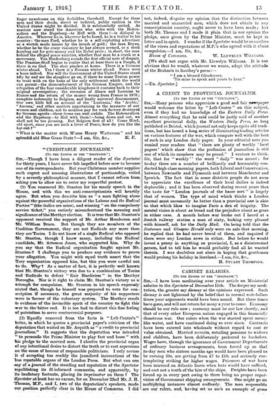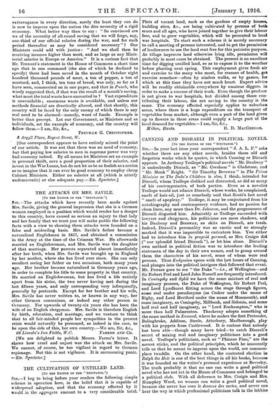CABINET SALARIES.
[To THE DIDITOS. OF " SFXCIA102.1
S11:4—I have been meditating over your article on Ministerial salaries in the Spectator of December I I th. The deeper my medi- tation, the greater my dismay at the opinions expressed. Such dismay is not lightened by the belief that in normal ante-bellum times your arguments would have been sound. But these times have gone, and-will not return-for many a year to come. Economy should be our role now ; economy must be our law shortly, and that of every other European nation engaged in this financially disastrous war. Our rulers •when the war started spent -money like water, and have continued doing so ever since. Contracts have been entered into wholesale without regard to cost or value obtained. Married recruits, entailing pensions to widows and children, have been deliberately preferred to bachelors. Wages have, through the ignorance of Government Departments of ordinary business arrangements, been forced up so that to-day men who sixteen months ago would have been pleased to be earning 50s. are getting from £7 to £10, and seriously con- templating striking for higher wages. Prisoners of war have been interned on Atlantic liners when huts would have sufficed, and cost not a tetith-orthe'hire of the ships. Freights have been forced up in every port owing to there being -no proper super- . vision of Government shipping arrangements. One might goon multiplying instances almost endlessly. The men responsible are our rulers, and, having set us such an example of gross extravagance in every direction, surely the least they can do is now to impress upon the nation the dire necessity of a rigid economy. What better way than to say : " So convinced are we of the necessity of all-round saving that we will forgo, say, one-third of our official salaries during the war, and for such period thereafter as may be considered necessary" ? Our Ministers could add with justice : " And we shall then be receiving incomes higher than most, and as large as any Minis- terial salaries in Europe or America." It is a curious fact that Mr. Tennant's statement in the House of Commons a short time ago that in one command (the size of which he declined to specify) there had been saved in the month of October eight hundred thousand pounds of meat, a ton of pepper, a ton of mustard, and, I think, ten tons of bread, was only, so far as I have seen, commented on in one paper, and that in Punch, who wisely suggested that, if that was the result of a month's saving, what must the total waste have amounted to ? Vast expenditure is unavoidable ; enormous waste is avoidable, and unless our methods financial are drastically altered, and that shortly, this country will be faced by the only enemy of which there is any real need to be alarmed—namely, want of funds. Example is better than precept. Let our Government, as Ministers and as individuals, set the example of economy, and the country will follow them.—I am, Sir, &c., FREVILLE G. CHRISTOPHER.
6 Argyll Place, Regent Street, TV.
[Our correspondent appears to have entirely missed the point of our article. It was not that there was no need of economy, but that paying low salaries to men in supreme power was very bad economy indeed. By all means let Ministers set an example in personal thrift, save a good proportion of their salaries, and invest in the War Loans, but do not let us be so foolish as a nation as to imagine that it can ever be good economy to employ cheap Cabinet Ministers. Either no salaries at all (which is utterly undemocratic) or else adequate pay.—En. Spectator.]











































 Previous page
Previous page